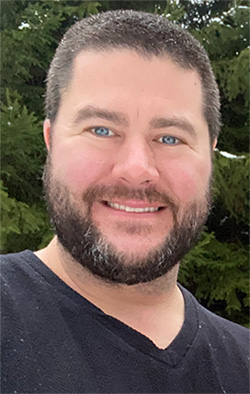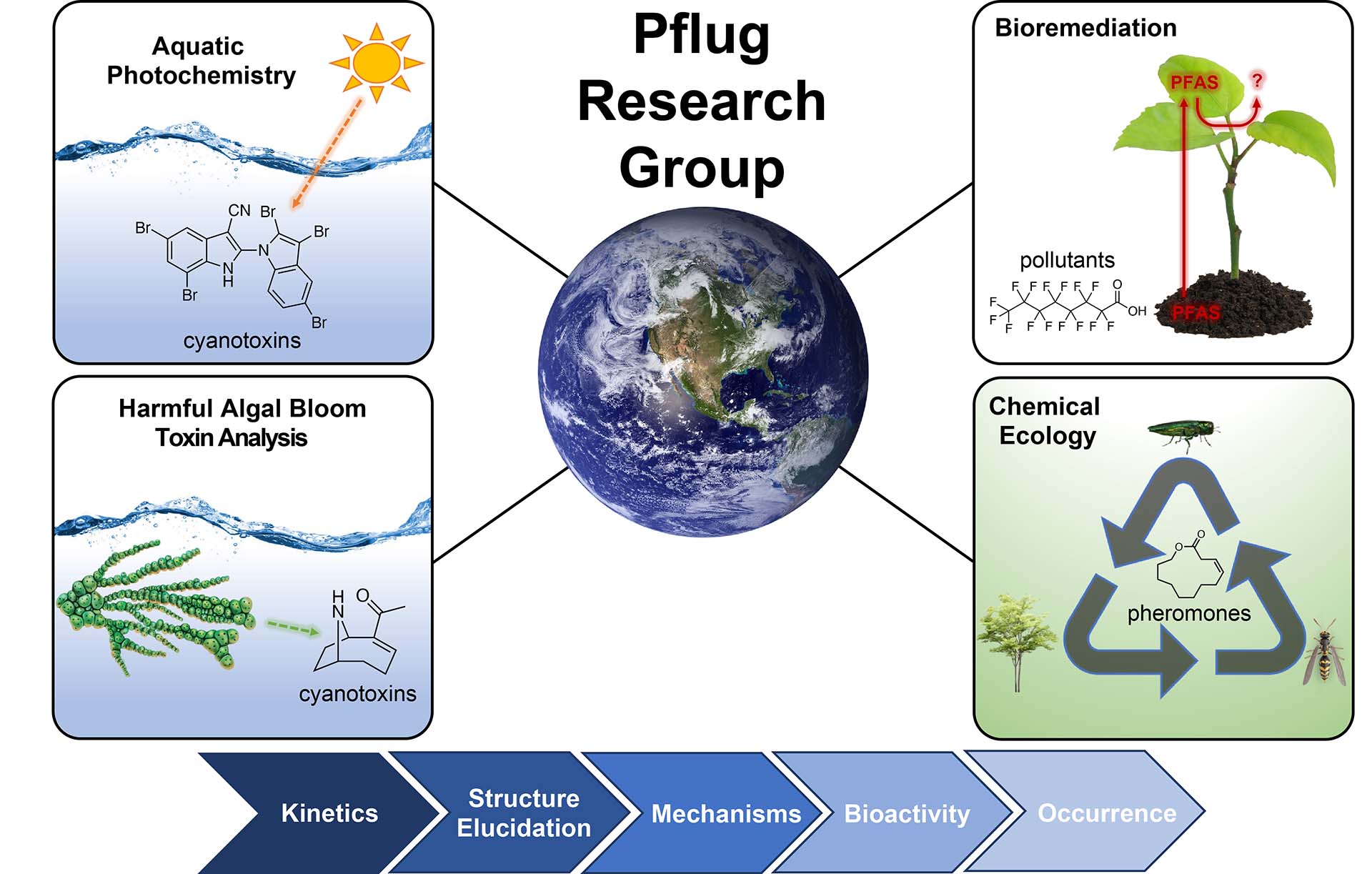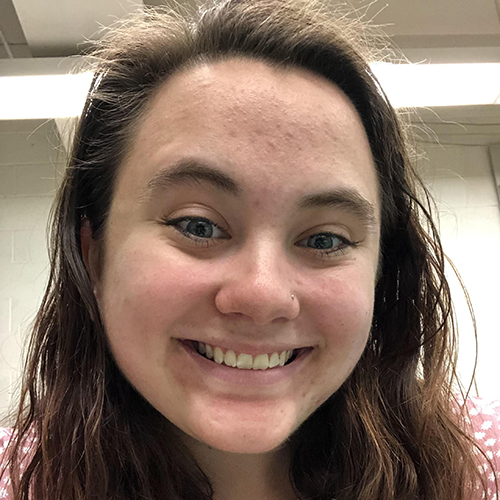Faculty Profile
Nicholas Pflug


Assistant Professor
Department of Chemistry
315 Jahn Laboratory
Education
Postdoctoral, Environmental Chemistry, ETH Zurich, 2018-2021
Ph.D., Chemistry, University of Iowa, 2017
M.S., Chemistry, University of Nevada, Reno, 2013
Research

Research in the Pflug Lab focuses on the identification and fate of organic chemicals in natural and engineered environmental systems.
Research efforts in the Pflug Lab utilize a variety of methods from environmental chemistry, natural products chemistry, and organic synthesis to address the challenges of environmental contamination and its effects on human and ecosystem health and also to fill knowledge gaps in key biophysicochemical processes of organic compounds in the environment.
Our research focuses on the following four areas: (i) aquatic photochemistry of organic chemicals (e.g., pollutants, pheromones, DOM, and natural toxins), (ii) harmful algal bloom toxin analysis and monitoring, (iii) bioremediation of pollutants of emerging concern (e.g., phyto- and mycoremediation of PFAS), and (iv) chemical ecology of invasive pest species (e.g., identification and synthesis of semiochemicals for the purpose of biocontrol). For this work, an emphasis is placed on kinetics, structure elucidation, mechanistic studies, biological effects, and occurrence studies. Current funding for the projects derives from a variety of federal agencies such as: NOAA, NSF, and USDA.
Students will gain proficiency in the areas of organic synthesis, chemical analysis, separations, extractions, isolations, and structure elucidation, and natural photochemical processes (e.g., direct and indirect photolysis).
Please feel free to email me directly to ask questions and express your interest in our program.
Courses Taught
FCH 223: Organic Chemistry II
FCH 584: Spectrometric Identification of Organic Compounds
Current Graduate Students
Makayla Light
- Degree Sought: PhD
- Area of Study: Environmental Chemistry
- Project: Isolation, identification, and synthesis of sex-specific pheromones of a parasitoid wasp of the Emerald Ash Borer
Morgan Fatowe
- Degree Sought: PhD
- Area of Study: Environmental Chemistry
- Project: Aquatic photochemistry of livestock feed additives
Samantha Freeman
- Degree Sought: PhD
- Area of Study: Environmental Chemistry
- Project: Subcellular distribution and translocation mechanism of PFAS in hyperaccumulator plants
- Co-advisor: Dr. Lee Newman
Zac Triumph
- Degree Sought: PhD
- Area of Study: Organic Chemistry of Natural Products
- Project: Expansion of our anatoxin-a monitoring methods to include new and additional congeners
Gianna Leippert
- Degree Sought: MS
- Area of Study: Environmental Chemistry
- Project: Occurrence of PFAS in vegetative wildlife food sources at reforested contamination sites
- Co-advisor: Dr. Lee Newman
Michaela Fitzgerald
- Degree Sought: PhD
- Area of Study: Chemical Ecology
- Project: Chemical ecology of the Hemlock Woolly Adelgid and Hemlock Borer
- Co-advisor: Dr. Steve Teale
Current Postdocs
Dr. Jamie Nunziata
- Education: PhD, Chemistry, University of South Florida, 2023
- Project: Total synthesis of anatoxin-a and related congeners
Past Advisees
Sarah Crane - BS Environmental Chemistry (Honors Program), 2023. Current Position: PhD student, University of Iowa, Chemistry.
Selected Publications
Complete Listing: Google Scholar
- Pflug, N.C.; Kral, A.K.; Hankard, M.K., Breuckman, K.C.; Kolodziej, E.P.; Gloer, J.B.; Wammer, K.H.; Cwiertny, D.M. Photolysis of Trenbolone Acetate Metabolites in the Presence of Nucleophiles: Evidence for Metastable Photoaddition Products and Reversible Associations with Dissolved Organic Matter. Environ. Sci. Technol. 2020, 54, 12181-12190.
- Pflug, N.C.; Patterson, E.V.; Martinovic-Weigelt, D.; Kolodziej, E.P.; Gloer, J.B.; McNeill, K.; Cwiertny, D.M.; Wammer, K.H. Intramolecular [2+2] Photocycloaddition of Altrenogest: Confirmation of Product Structure, Theoretical Mechanistic Insight, and Bioactivity Assessment. J. Org. Chem. 2019, 84, 11366-11371.
- Apell, J.N.; Pflug, N.C.; McNeill, K. Photodegradation of Fludioxonil and Other Pyrroles: The Importance of Indirect Photodegradation for Understanding Environmental Fate and Photoproduct Formation. Environ. Sci. Technol. 2019, 53, 11240-11250.
- Pflug, N.C.; Knutson, C.J.; Martinovic-Weigelt, D.; Swenson, D.C.; Wammer, K.H.; Cwiertny, D.M.; Gloer, J.B. Bioactive Rearrangement Products from Aqueous Photolysis of Pharmaceutical Steroids. Org. Lett. 2019, 21, 3568-3571.
- Klarich, K.L.; Pflug, N.C.; DeWald, E.M.; Hladik, M.L.; Kolpin, D.W.; Cwiertny, D.M.; LeFevre, G.H. Occurrence of Neonicotinoid Insecticides in Finished Drinking Water and Fate during Drinking Water Treatment. Environ. Sci. Technol. Lett. 2017, 4, 168-173.
Current Graduate Advisees
 Morgan Fatowe
Morgan Fatowe
mbfatowe@syr.edu
- Degree Sought: PHD
- Graduate Advisor(s): Pflug and Newman
- Area of Study: Environ & Forest Chemistry
Graduate Research Topic
Bioremediation of PFAS
Past Studies
B.S. Biochemistry from Florida International University (FIU)
Past Studies
B.S. Biochemistry from Florida International University (FIU)
 Michaela Fitzgerald
Michaela Fitzgerald
mfitzg10@syr.edu
- Degree Sought: PHD
- Graduate Advisor(s): Teale and Pflug
- Area of Study: Environmental & Forest Biology
 Samantha Freeman
Samantha Freeman
sfreem04@syr.edu
- Degree Sought: PHD
- Graduate Advisor(s): Newman and Pflug
- Area of Study: Environ & Forest Chemistry
 Gianna Leippert
Gianna Leippert
gyleippe@syr.edu
- Degree Sought: MS
- Graduate Advisor(s): Pflug and Newman
- Area of Study: Environ & Forest Chemistry
Graduate Research Topic
Occurrence of per- and polyfluoroalkyl substances (PFAS) in vegetative wildlife food sources at reforested contamination sites
 Makayla Light
Makayla Light
malight@syr.edu
- Degree Sought: PHD
- Graduate Advisor(s): Pflug
- Area of Study: FCH Environmental Chemistry
LinkedIn
https://www.linkedin.com/in/makayla-light-b4245417b/
Graduate Research Topic
I am researching potentially novel volatile and cuticular pheromones produced by the native parasitoid of the emerald ash borer, Spathius galinae, using untargeted gas chromatography mass spectrometry.
 Zac Triumph
Zac Triumph
zctriump@syr.edu
- Degree Sought: PHD
- Graduate Advisor(s): Pflug
- Area of Study: Environ & Forest Chemistry